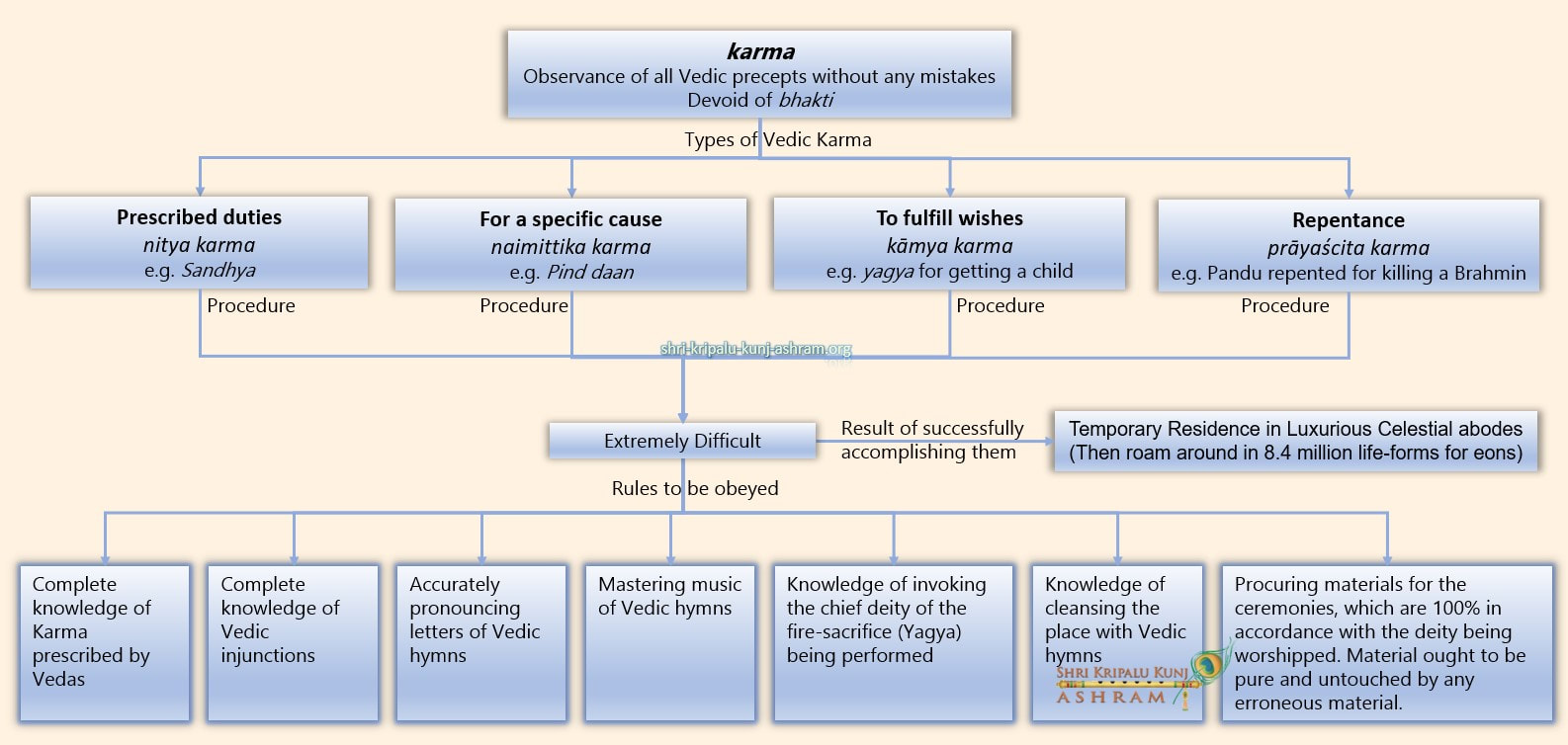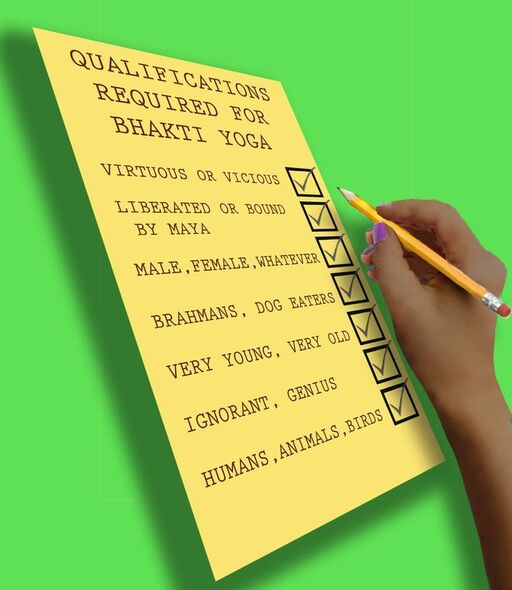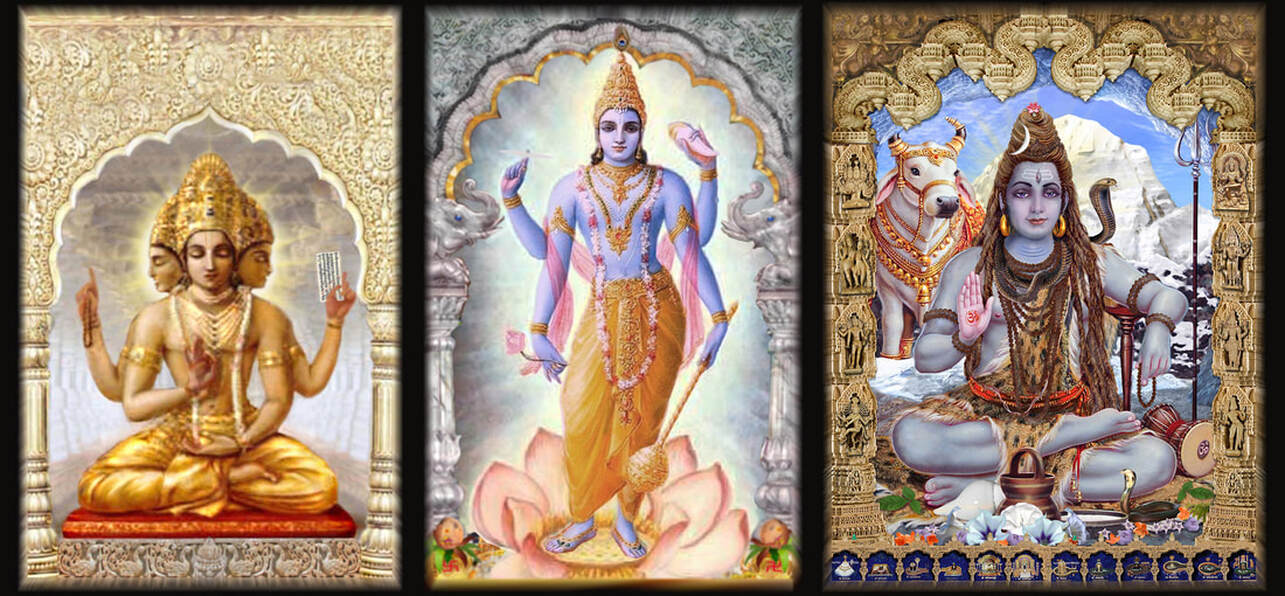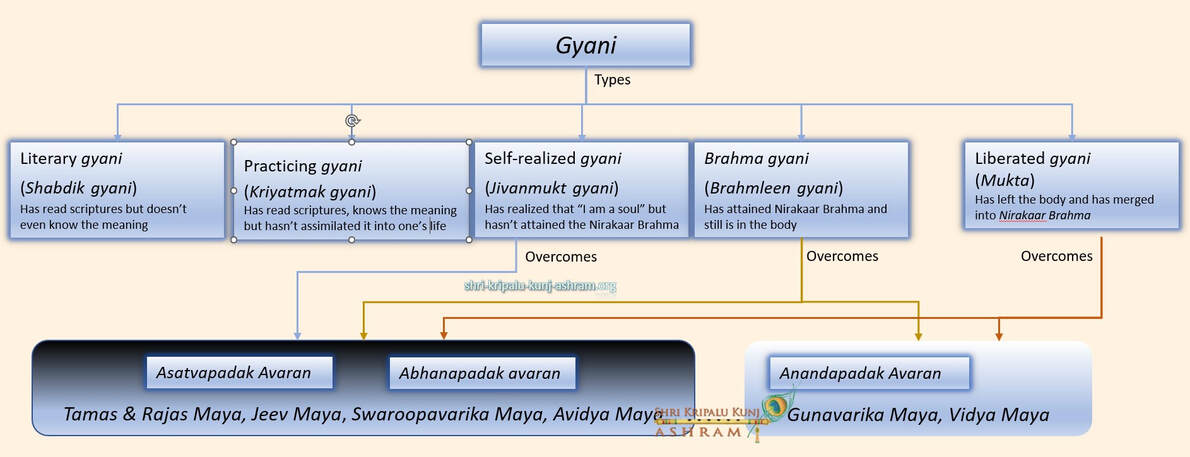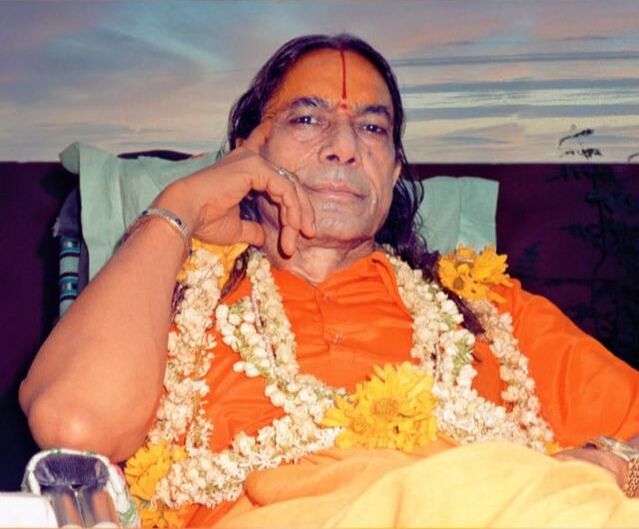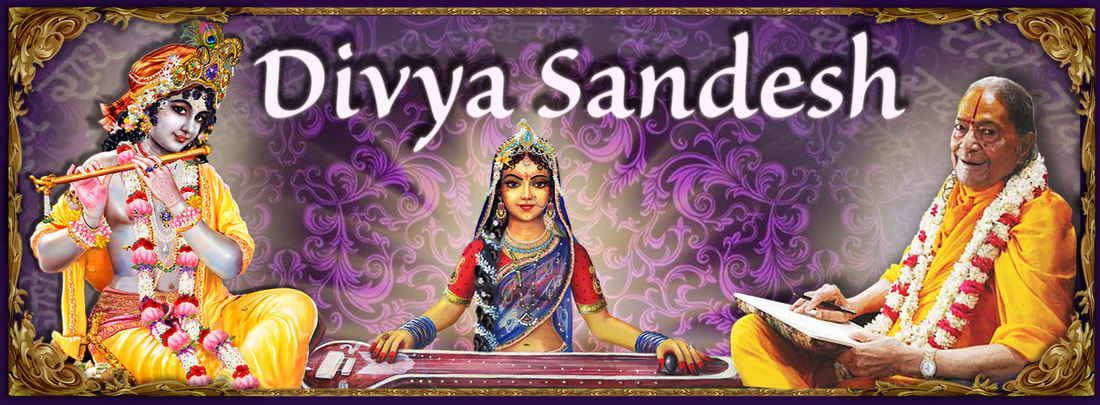Bhakti Is For All |
Mind is the cause of bondage as well as liberation. Since eternity, the mind has sought-after the material world to attain bliss and in the process it has become increasingly soiled (1). Hence, purification of the mind is imperative for getting the bliss we seek. In the previous two articles we discussed three litmus tests (Anvaya, Vyatireka and Anya-nirapekshata) to determine the right path for attaining our aim of life. And we tested karma, gyan and bhakti on all of those three criteria. Through various evidences from the scriptures and the saints, we proved that only bhakti meets those conditions. Bhakti is the only means to purify the mind.
In this article, we will take up the fourth criteria, Universality (सार्वत्रिकता), which means "easy for all to follow it". Let us put the paths of karma, gyan and bhakti to test on this criteria to know which path has universality.
First of all, it is difficult to get proper knowledge of the laws of Karma. Then its correct implementation is more difficult. If even a single mistake is made again, the host itself is destroyed. Again, many rituals are forbidden for women or non-Brahmins. Hence the question of universality does not arise at all.
Moreover, the path of karma involves worshiping celestial deities, and the rules and regulations to be followed for doing this are specified in the Vedas and are known as karmakand. The celestial deities themselves are under the bondage of Maya, hence the rules for worshiping them are extremely strict. This is similar to how in the affluent families in our world, there are many rules that servants of the household have to follow. Suppose a servant in a millionaire's house is serving breakfast to him, and by mistake some tea tips on the millionaire. Not only will the servant be yelled at, but he might also be fired from the job.
In comparison to a millionaire on earth, the celestial deities have a lot more luxuries in swarg. Accordingly their rules are a lot stricter and violation of those has very grave consequences. There are 6 very strict rules in the karmakand which have to be followed to the letter. If a single rule is violated, even in the slightest, then the gods and goddesses get angry and the host who conducts the rituals is severely punished.
In this article, we will take up the fourth criteria, Universality (सार्वत्रिकता), which means "easy for all to follow it". Let us put the paths of karma, gyan and bhakti to test on this criteria to know which path has universality.
First of all, it is difficult to get proper knowledge of the laws of Karma. Then its correct implementation is more difficult. If even a single mistake is made again, the host itself is destroyed. Again, many rituals are forbidden for women or non-Brahmins. Hence the question of universality does not arise at all.
Moreover, the path of karma involves worshiping celestial deities, and the rules and regulations to be followed for doing this are specified in the Vedas and are known as karmakand. The celestial deities themselves are under the bondage of Maya, hence the rules for worshiping them are extremely strict. This is similar to how in the affluent families in our world, there are many rules that servants of the household have to follow. Suppose a servant in a millionaire's house is serving breakfast to him, and by mistake some tea tips on the millionaire. Not only will the servant be yelled at, but he might also be fired from the job.
In comparison to a millionaire on earth, the celestial deities have a lot more luxuries in swarg. Accordingly their rules are a lot stricter and violation of those has very grave consequences. There are 6 very strict rules in the karmakand which have to be followed to the letter. If a single rule is violated, even in the slightest, then the gods and goddesses get angry and the host who conducts the rituals is severely punished.
It was difficult to abide by all the ritualistic rules of karmakand in other yugas as well, but it is absolutely impossible to perform these rituals correctly in Kaliyuga. So it is evident that karma does not meet the criteria of Universality, as it cannot be followed by everyone.
Now let us examine the path of gyan.
Now let us examine the path of gyan.
|
कहत कठिन समुझत कठिन, साधन कठिन विवेक ।
होहि घुणाक्षर न्याय ज्यों, त्यों प्रत्युष अनेक ।। |
kahata kaṭhina samujhata kaṭhina, sādhana kaṭhina viveka ।
hohi ghuṇākṣara nyāya jyoṃ, tyoṃ pratyuṣa aneka ।। |
"It is difficult to speak about the philosophy of the path of gyan. It is even more difficult to understand it. Then there can be only a rare person who walks on it."
|
ग्यान अगम प्रत्यूह अनेका, साधन कठिन ना मन कहँ टेका
|
jñāna agama pratyūha anekā, sādhana kaṭhina nā mana kaham̐ ṭekā
|
"The path of gyan is difficult as there is nothing to focus on".
Before walking on the path of gyan, one has to be endowed with 4 qualities of the mind, in other words the mind has to master four states known as Sadhan-Chatushtaya. According to Shankaracharya, the first step to walk on the path of gyan is to control the mind. Only after having absolute control over the mind, can one step on the path of gyan. Its level of difficulty is so great that even 8 people out of 8 billion will not be eligible to walk on this path. That is a bold statement, so let me illustrate “What does mind control look like?” with an example.
You must have heard about King Janak. He was Mother Sita’s father and father-in-law of Lord Shri Ram.
Yagyavalkya was the Guru of King Janak. He always used to ensure King Janak sits in the front row in his classes. This made other students jealous. Their interpretation was that Janak is the king, so Guru ji makes him sit in front. When Guru ji came to know this, he unfolded a leela with the power of Yogmaya. While he was teaching, he set fire to the huts of the disciples in his ashram. In those days the students in ashram used to have just one spare loin cloth and a kamandal (a vessel in which they carried water). All the students ran away from Guru ji's class to save their meager belongings as soon as the fire broke out.
Before walking on the path of gyan, one has to be endowed with 4 qualities of the mind, in other words the mind has to master four states known as Sadhan-Chatushtaya. According to Shankaracharya, the first step to walk on the path of gyan is to control the mind. Only after having absolute control over the mind, can one step on the path of gyan. Its level of difficulty is so great that even 8 people out of 8 billion will not be eligible to walk on this path. That is a bold statement, so let me illustrate “What does mind control look like?” with an example.
You must have heard about King Janak. He was Mother Sita’s father and father-in-law of Lord Shri Ram.
Yagyavalkya was the Guru of King Janak. He always used to ensure King Janak sits in the front row in his classes. This made other students jealous. Their interpretation was that Janak is the king, so Guru ji makes him sit in front. When Guru ji came to know this, he unfolded a leela with the power of Yogmaya. While he was teaching, he set fire to the huts of the disciples in his ashram. In those days the students in ashram used to have just one spare loin cloth and a kamandal (a vessel in which they carried water). All the students ran away from Guru ji's class to save their meager belongings as soon as the fire broke out.
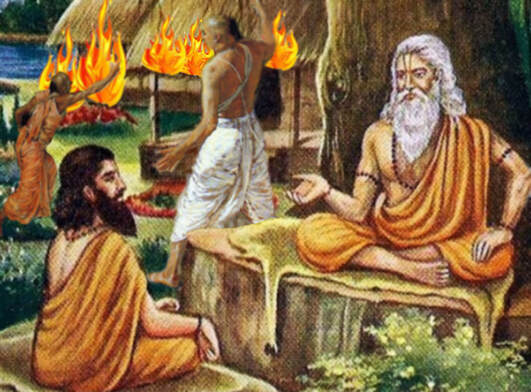 Janak learning about Brahma from Yagyavalka
Janak learning about Brahma from Yagyavalka
When everyone came back and sat down to study, Yagyavalkya set Janakpuri (kingdom of King Janak) on fire. King Janak's soldiers came running and told him about it. However, Janak ignored them. He apologized to his Guru for the disturbance and said “Guru Ji, please tell me the characteristics of Brahm". After a while some more soldiers came and told him that his queens’ palaces have also caught fire and that all the queens had started burning. King Janak reprimanded them and said, "Go extinguish the fire and don't come here again". Then Yagyavalkya asked Janak, “Why are you not going?” To this, Janak said, “All this is transient, but what you are giving will go with me even after death, so I am sitting here to get the same and not leaving.”
Then Yagyavalkya addressed the other boys and said that King Janak was so unaffected and equipoised even when the whole kingdom was burning, that he did not get up to leave. On the other hand, all of you ran away to save your loincloth and a Kamandal when I was giving you the knowledge of Brahm.
If a person is as detached as King Janak, then he meets the eligibility criteria to walk on the path of gyan. Now, reflect for a moment, how many people have this level of detachment (vairagya) from the Sansaar-The World today ?
This state was rare even in Satyuga and now in Kaliyuga, it is near impossible. And after becoming eligible to walk on the path of gyan, the Sadhana to attain Brahmanand is even more difficult. So it is natural that this path cannot be for everyone. That means there is no universality in the path of gyan either.
Now let us discuss the eligibility criteria to walk on the path of bhakti. Celestial deities have negligible opulence as compared to divine majesty of God and the rules for worshiping them are so strict. So logically speaking, the rules for worshiping God must be stricter. Right? When we are incapable of doing karma and ineligible to enter the path of gyan, then how could we possibly be eligible to do bhakti?
Yes, there was no one equal to God, neither is, nor will there ever be. However, you will be surprised to know that there is absolutely no pre-qualification for doing devotion to God.
Then Yagyavalkya addressed the other boys and said that King Janak was so unaffected and equipoised even when the whole kingdom was burning, that he did not get up to leave. On the other hand, all of you ran away to save your loincloth and a Kamandal when I was giving you the knowledge of Brahm.
If a person is as detached as King Janak, then he meets the eligibility criteria to walk on the path of gyan. Now, reflect for a moment, how many people have this level of detachment (vairagya) from the Sansaar-The World today ?
This state was rare even in Satyuga and now in Kaliyuga, it is near impossible. And after becoming eligible to walk on the path of gyan, the Sadhana to attain Brahmanand is even more difficult. So it is natural that this path cannot be for everyone. That means there is no universality in the path of gyan either.
Now let us discuss the eligibility criteria to walk on the path of bhakti. Celestial deities have negligible opulence as compared to divine majesty of God and the rules for worshiping them are so strict. So logically speaking, the rules for worshiping God must be stricter. Right? When we are incapable of doing karma and ineligible to enter the path of gyan, then how could we possibly be eligible to do bhakti?
Yes, there was no one equal to God, neither is, nor will there ever be. However, you will be surprised to know that there is absolutely no pre-qualification for doing devotion to God.
|
Why? This appears to be against the rules !
God is the eternal father of the jeev and is also gracious and compassionate by nature. Even in this selfish-motive-driven world, it is seen that a caring-father teaches the children, ignores their mistakes and encourages them to improve by judiciously teaching them, using rewards for good behaviors and punishment for the undesirable ones. |
|

Being divine and truly gracious (2), God cares a lot more than the worldly father and graces the jeev in order to bestow true lasting and ever-increasing bliss. That's why God has relaxed the rules for His children. This is the reason why He has not kept any pre-qualification for worshiping Him.
Everyone who is not-very-attached to the world and not-very-detached from it, has the right to walk on the path of bhakti. All living beings under the bondage of Maya, in fact, fall in this category. They are not-very-detached because people find some joy in the world, yet they are not-very-attached to the world because no one gets any lasting bliss in the world. And this is why every jeev has a little bit of detachment from the Sansaar-The World and at the same time a little bit of attachment to God.
Thus, everyone is entitled to follow this path.
Tulsidas Ji says in the Ramayan,
Everyone who is not-very-attached to the world and not-very-detached from it, has the right to walk on the path of bhakti. All living beings under the bondage of Maya, in fact, fall in this category. They are not-very-detached because people find some joy in the world, yet they are not-very-attached to the world because no one gets any lasting bliss in the world. And this is why every jeev has a little bit of detachment from the Sansaar-The World and at the same time a little bit of attachment to God.
Thus, everyone is entitled to follow this path.
Tulsidas Ji says in the Ramayan,
|
पुरुष नपुंसक नारि नर जीव चराचर कोइ। सर्व भाव भज कपट तजि मोहि परम प्रिय सोइ।
साधक सिद्ध विमुक्त उदासी, कवि कोविद कृतज्ञ सन्यासी । योगी शूर सुतापस ज्ञानी, धर्मनिरत पंडित विज्ञानी । तरइ न बिनु सेये मम स्वामी, राम नमामि नमामि नमामि । puruṣa napuṃsaka nāri nara jīva carācara koi। sarva bhāva bhaja kapaṭa taji mohi parama priya soi। sādhaka siddha vimukta udāsī, kavi kovida kṛtajña sanyāsī । yogī śūra sutāpasa jñānī, dharmanirata paṃḍita vijñānī । tarai na binu seye mama svāmī, rāma namāmi namāmi namāmi । “Every living being who abandons deceit and sincerely performs devotion to God, is very dear to God”.
Now, let us shed some light on the different categories of living beings who are eligible to walk on the path of bhakti. |
Swansh and Vibhinnansh
The three governors of a brahmand are Brahma, Vishnu (3) and Shankar, and are together referred to as Tridev. They are a part of God's Parashakti (internal potency) hence are called swansh and are God-like. They govern Swaroop Shakti (God’s intimate divine power). They also do Bhakti of Shri Krishna. And other living beings like us, who are part of jeev shakti are called vibhinnansh. Both are eligible to do devotion.
The three governors of a brahmand are Brahma, Vishnu (3) and Shankar, and are together referred to as Tridev. They are a part of God's Parashakti (internal potency) hence are called swansh and are God-like. They govern Swaroop Shakti (God’s intimate divine power). They also do Bhakti of Shri Krishna. And other living beings like us, who are part of jeev shakti are called vibhinnansh. Both are eligible to do devotion.
Virtuous as well as vicious
The one who has divine qualities is called virtuous. Without doing bhakti, there cannot be an abundance of devotional qualities in anyone (4). Even if one learns to practice them using their will power, they cannot retain those qualities permanently. The true meaning of virtuous is the one who does devotion to God.
Miscreants also have the right to do devotion. Sinners like Ajamil (5) and Ganika have also achieved their aim of life by doing bhakti. To the extent that the dacoit Ratnakar (6), who was so sinful that he could not say Ram, he too was eligible to do devotion. And by doing bhakti, he got transformed into the great sage, Valmiki.
Knowledgeable as well as ignorant
True knowledge is that which increases love for God. Therefore, it is obvious that the knowledgeable ones would do devotion to God, but the ignorant also have the right to do devotion. Even a country bumpkin like Dhanna Jat (7) can bring God, in a week, under his control through his unswerving faith and love.
The one who has divine qualities is called virtuous. Without doing bhakti, there cannot be an abundance of devotional qualities in anyone (4). Even if one learns to practice them using their will power, they cannot retain those qualities permanently. The true meaning of virtuous is the one who does devotion to God.
Miscreants also have the right to do devotion. Sinners like Ajamil (5) and Ganika have also achieved their aim of life by doing bhakti. To the extent that the dacoit Ratnakar (6), who was so sinful that he could not say Ram, he too was eligible to do devotion. And by doing bhakti, he got transformed into the great sage, Valmiki.
Knowledgeable as well as ignorant
True knowledge is that which increases love for God. Therefore, it is obvious that the knowledgeable ones would do devotion to God, but the ignorant also have the right to do devotion. Even a country bumpkin like Dhanna Jat (7) can bring God, in a week, under his control through his unswerving faith and love.
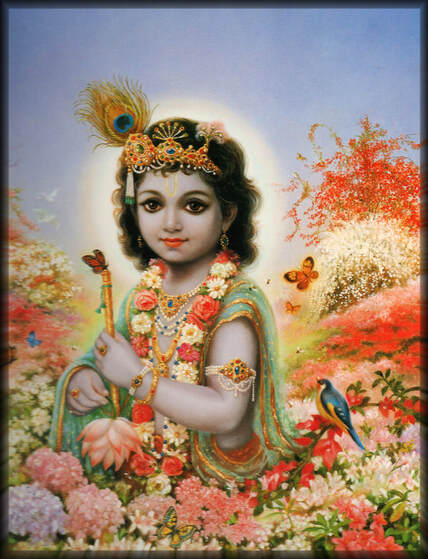 In Braj many liberated gyanis had descended as plants and trees to relish pastimes of Shri Krishna
In Braj many liberated gyanis had descended as plants and trees to relish pastimes of Shri Krishna
Detached from the world as well as attached to the world
King Janak was extremely disinterested in worldly attractions, that's why he got the title of Videha. Even those with such a level of detachment are entitled to do devotion. You must have heard that King Janak was mesmerized on seeing Shri Ram in the garden.
The jeev who is attached to the material world has turned away from God since eternity. Such a jeev also has the right to do devotion. All the Vedas and Shastras have been written for such people only so that they can start treading the path of devotion to attain God's love.
Liberated as well as those bound by Maya
The ones who are detached from the world will certainly be attached to God. Why? Because the mind is restless, so it can never remain in a state in which it does nothing. There is no third place other than the world of maya and the divine realm. The one who has no interest in the worldly affairs, will definitely have affection for God.
The one who is highly attached to the subjects of the senses is also entitled to do devotion. You must have heard the story of Tulsidas. He was so attached to his wife that he went to visit her in his in-laws home. There, instead of knocking at the door and entering like normal people, he was so desperate that he reached her room by using a snake as a rope. When a full grown man climbs up holding a snake, then that would stress the snake. With the pain the snake must have twitched and contorted its body. Tulsidas was so pre-occupied with thoughts of his wife that he didn’t perceive any of that. Such people who are so acutely enslaved by the sense objects are also entitled to do devotion.
Those Under Maya as well as those beyond Maya
Those who are bound by Maya will have to do devotion to become Mayateet (the one who is beyond the control of Maya). According to Shankaracharya, every now and then (i.e. one among millions) a liberated gyani who has left the body and merged in Nirakar brahm, assumes a body again and does devotion to get divine-love. Those who have become free from Maya and are still in human form are also entitled to do devotion.
King Janak was extremely disinterested in worldly attractions, that's why he got the title of Videha. Even those with such a level of detachment are entitled to do devotion. You must have heard that King Janak was mesmerized on seeing Shri Ram in the garden.
The jeev who is attached to the material world has turned away from God since eternity. Such a jeev also has the right to do devotion. All the Vedas and Shastras have been written for such people only so that they can start treading the path of devotion to attain God's love.
Liberated as well as those bound by Maya
The ones who are detached from the world will certainly be attached to God. Why? Because the mind is restless, so it can never remain in a state in which it does nothing. There is no third place other than the world of maya and the divine realm. The one who has no interest in the worldly affairs, will definitely have affection for God.
The one who is highly attached to the subjects of the senses is also entitled to do devotion. You must have heard the story of Tulsidas. He was so attached to his wife that he went to visit her in his in-laws home. There, instead of knocking at the door and entering like normal people, he was so desperate that he reached her room by using a snake as a rope. When a full grown man climbs up holding a snake, then that would stress the snake. With the pain the snake must have twitched and contorted its body. Tulsidas was so pre-occupied with thoughts of his wife that he didn’t perceive any of that. Such people who are so acutely enslaved by the sense objects are also entitled to do devotion.
Those Under Maya as well as those beyond Maya
Those who are bound by Maya will have to do devotion to become Mayateet (the one who is beyond the control of Maya). According to Shankaracharya, every now and then (i.e. one among millions) a liberated gyani who has left the body and merged in Nirakar brahm, assumes a body again and does devotion to get divine-love. Those who have become free from Maya and are still in human form are also entitled to do devotion.
You must have heard many times from Shri Maharaj Ji that there was not even a single person in the kingdom of Ram who was under the realm of Maya, they had all descended with Shri Ram to participate in his pastimes. Along similar lines, you must have also heard that in Braj, many great Paramhansas (liberated gyani) took the forms of trees and creepers and stood upside down, to enjoy the pastimes of Shri Krishna.
Brainiacs as well as Dunce
All the Jagadgurus, Madhusudan Saraswati etc. scholars do devotion anyway. However, fools also have the right to worship. In fact, of all devotees, learned devotees are less in number. Most of the devotees have been simpleton and illiterate, and have achieved their ultimate aim of life through devotion.
Men as well as Women
You must have heard the names of many male saints like Tulsi, Soor, Kabir, Nanak, Tukaram and the five Jagadgurus. So it is self-evident that men are entitled to devotion. By the grace of Shri Maharaj ji, you have come to know that the forest dwelling women of Braj (called Gopis) are the emblem of bhakti. That means women are also entitled to devotion.
Children as well as Elderly
God does not look at the age of the devotees. You must have heard the story of Dhruva (8) and Prahalad (9) who attained God at the age of 5. And Guru Vashishtha, Kabir etc. continued to do bhakti even in their old age. Young, old and everyone in the middle are entitled to do bhakti.
Brahmins as well as those in lower strata
God does not see the caste, creed or clan of the devotees. Raidas (10), Kabir, and many Sufi saints were not Brahmins, but were very dear to God (11). Along with this, the high elite Brahmins are also entitled to do devotion e.g. Chaitanya Mahaprabhu, Shri Maharaj Ji were born in a high class Brahmin family.
Brainiacs as well as Dunce
All the Jagadgurus, Madhusudan Saraswati etc. scholars do devotion anyway. However, fools also have the right to worship. In fact, of all devotees, learned devotees are less in number. Most of the devotees have been simpleton and illiterate, and have achieved their ultimate aim of life through devotion.
Men as well as Women
You must have heard the names of many male saints like Tulsi, Soor, Kabir, Nanak, Tukaram and the five Jagadgurus. So it is self-evident that men are entitled to devotion. By the grace of Shri Maharaj ji, you have come to know that the forest dwelling women of Braj (called Gopis) are the emblem of bhakti. That means women are also entitled to devotion.
Children as well as Elderly
God does not look at the age of the devotees. You must have heard the story of Dhruva (8) and Prahalad (9) who attained God at the age of 5. And Guru Vashishtha, Kabir etc. continued to do bhakti even in their old age. Young, old and everyone in the middle are entitled to do bhakti.
Brahmins as well as those in lower strata
God does not see the caste, creed or clan of the devotees. Raidas (10), Kabir, and many Sufi saints were not Brahmins, but were very dear to God (11). Along with this, the high elite Brahmins are also entitled to do devotion e.g. Chaitanya Mahaprabhu, Shri Maharaj Ji were born in a high class Brahmin family.
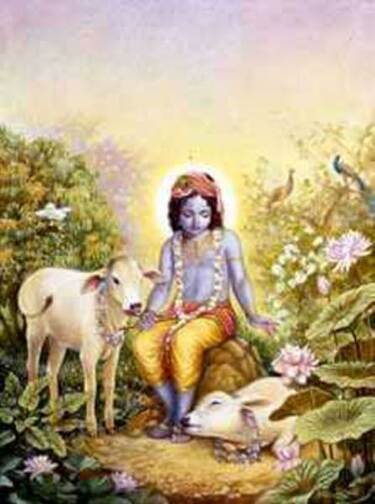 Shri Krishna graced even the animals birds and plants
Shri Krishna graced even the animals birds and plants
Humans as well as animals and birds
Humans are entitled to do bhakti anyway, but even animals and birds, even trees are entitled to do bhakti . You must have heard the story of Gajraj (12) who also crossed the ocean of Maya through devotion. In Tretayuga Kagbhushundi a crow, Jatayu - a vulture, also worshipped Lord Shri Ram. In Dwaparyug great Paramhansas (mukt) had taken the form of a tree and were entitled to shower flowers on the divine couple, Shyama Shyam, when They were swinging together on the swing which was tied to their branches.
What more can be said except that, other than inanimate objects (which do not have consciousness, senses, mind and intellect), everyone is entitled to do devotion. Therefore, only the path of Bhakti has the quality of universality.
Humans are entitled to do bhakti anyway, but even animals and birds, even trees are entitled to do bhakti . You must have heard the story of Gajraj (12) who also crossed the ocean of Maya through devotion. In Tretayuga Kagbhushundi a crow, Jatayu - a vulture, also worshipped Lord Shri Ram. In Dwaparyug great Paramhansas (mukt) had taken the form of a tree and were entitled to shower flowers on the divine couple, Shyama Shyam, when They were swinging together on the swing which was tied to their branches.
What more can be said except that, other than inanimate objects (which do not have consciousness, senses, mind and intellect), everyone is entitled to do devotion. Therefore, only the path of Bhakti has the quality of universality.
|
कर्म आदि में नियम, गोविंद राधे । भक्ति में नियम, कछु ना बता दे ॥
karma ādi meṃ niyama, goviṃda rādhe । bhakti meṃ niyama, kachu nā batā de ॥ - राधा गोविंद गीत
जगद्गुरु स्वामी श्री कृपालु जी महाराज When following other expedients of spiritual upliftment like karma, one has to abide by many rules. But there are no rules for those following the path of bhakti.
- Radha Govind Geet
Jagadguruttam Swami Shri Kripalu Ji Maharaj |
Some Pointers to Explore our Literature
Indulge yourself in spiritual material - Click on the images below or the headers
Divya Sandesh
|
Divya Ras Bindu
|
Spiritual TermsDeepen your understandingKnow the real meanings of scriptural words
|
|
We would love to hear from you. Please
|
To get notification about our publications please subscribe by entering the information above
|




